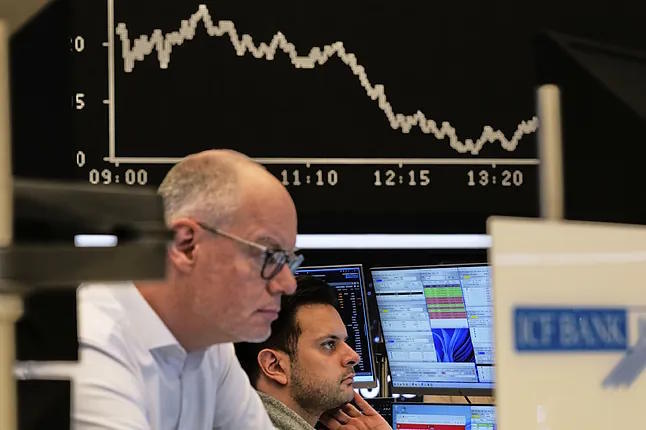Liberation Day arrived, and Donald Trump announced his distribution of tariffs for his trading partners (around 60 countries). The average tariff, around 23%, is the highest duty imposed in over a century, as analysts point out.
While the minimum tariff of 10% will come into effect next Saturday, April 5, and the specific tariffs (for each country or economic bloc) from April 9, its impact has already hit markets worldwide: from the session of widespread losses in Asia, a redcontagion has reached European markets, which are already expected to affect Wall Street.
The main European stock markets have opened with sharp declines: Paris and Frankfurt have fallen by 2.14%, while Milan has dropped by 1.85% and London by 1.42%. Losses in the British stock market have not been as severe since the UK will initially face tariffs of 10%, the lowest in Trump's proposed tariff list.
The Ibex has opened with a drop of 1.58%; to stand at 13,140.5 points, causing the index to reduce its gains for the year to 13.33%. The most affected stocks in the early trading are CaixaBank, with a 4.07% decrease in its value; followed by Santander, with losses of 3.68%; and ArcelorMittal (-3.04%). On the other hand, in the green zone, Grifols (up 3% driven by the latest news on Brookfield's takeover bid), the pharmaceutical company Rovi (+1.58%), and Iberdrola (+1.12%) have seen gains.
Among the most affected sectors in Europe is banking, dragged down by fears of a recession and reduced economic activity, and for the same reason, companies in the consumer sector, such as those focused on fashion or tourism. Therefore, Spanish financial institutions are joined in the red by banks like Unicredit (Italy), BNP Paribas (France), or Barclays (London), among others.
Experts also point out the high levels of volatility reflected in the market by the VIX, the fear index, which has already exceeded 23 points at the opening. Looking for a more tangible aspect of this uncertainty, one only needs to look at the value of safe-haven assets, such as gold: its price has surged to reach a new all-time high, nearing $3,200 per ounce.
Experts suggest that there is still room for negotiation in the coming days before the reciprocal tariffs take effect. Few doubts remain about Trump's intentions with his tariffs, which aim to bring production back to the US, but analysts already warn of the (very negative) short-term impact on US economic growth: the increased risk of recession and inflation is almost tangible, and the consequent impact on consumers, even though in the medium term, the American industry may strengthen, according to analysts at Renta4, "the question is how much damage Trump is willing to bear in the short term in his own economy, with a growing risk of stagflation."
At the opening of the stock market, within the commodities market, the price of a barrel of Brent crude oil fell to $72.66 (-3.06%), and Texas crude oil dropped by 3.29% to $69.35. In the currency market, the euro was trading at 1.0982 dollars. In the debt market, the yield on the Spanish 10-year bond stood at 3.275%; at the opening, the German bond also experienced a sharp decline, dropping to 3.5%.
Futures provide an indication of the stock market's trajectory before its opening, estimating the prices and quantities expected to occur. At the opening of European stock markets, Wall Street futures recorded the biggest losses. In a day that is already critical for the markets, the main American indices anticipate losses that, in the case of the Nasdaq, reach 3.5% and for the S&P 500, 3%.
Before the opening of Western markets, the Asian stock market session takes place, being the first to feel the impact of Trump's new measures. Yesterday, the American president announced a particularly harsh reciprocal tariff for China: a duty of 34% added to the existing 20% rates. As a result, Chinese imports will be subject to a total duty of 54%. In the case of Taiwan (the main semiconductor producer), it will face a duty of 32%, while for India, it will be 26%, and 24% for Japan.
Overall, the main Asian indices experienced a day of Thursday with significant losses: up to 1,449 companies were adversely affected in Thursday's session, as reported by the Efe agency. The Nikkei, the benchmark index in Japan, suffered losses of 3%, while in the case of China's Hang Seng, they reached 2.05%. Vietnam was the hardest-hit country, with its main index, the VN, dropping by 6%.
Automotive companies, directly affected by the 25% tariffs in effect from this Thursday, suffered significant losses in Asia: for instance, Toyota, the world's leading vehicle manufacturer in terms of sales volume and market capitalization in Tokyo, saw a 5.19% drop, while Honda and Nissan lost 2.38% and 3.59%, respectively. However, the wave of declines also affected technology and consumer companies. The video game company Nintendo, for example, fell by 3.26%.
"The tariffs announced last night represent a more negative scenario than what the market was expecting, and therefore the immediate reaction at the market opening today is significant declines in the stock markets," explain analysts at Bankinter. They add: "In short, this scenario of a trade war, and pending the reaction of the countries affected by it, implies a short-term worsening of the global economic cycle and a generalized increase in inflation."
